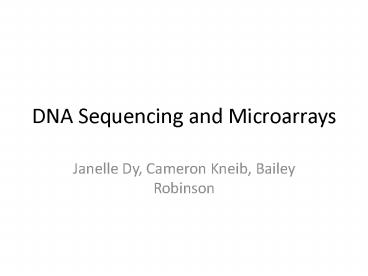DNA Sequencing and Microarrays - PowerPoint PPT Presentation
1 / 20
Title:
DNA Sequencing and Microarrays
Description:
DNA Sequencing and Microarrays Janelle Dy, Cameron Kneib, Bailey Robinson History of Sequencing 1973- Walter Gilbert and Allan Maxam sequence 24 bp 1975- Frederic ... – PowerPoint PPT presentation
Number of Views:140
Avg rating:3.0/5.0
Title: DNA Sequencing and Microarrays
1
DNA Sequencing and Microarrays
- Janelle Dy, Cameron Kneib, Bailey Robinson
2
History of Sequencing
- 1973- Walter Gilbert and Allan Maxam sequence 24
bp - 1975- Frederic Sanger develops chain-termination
method - 1987- Applied Biosystems sells first sequencing
machine- ABI 370
http//en.wikipedia.org/wiki/Frederick_Sanger
3
Sanger Sequencing and Other Sequencing Methods
- Chain Termination Sequencing- uses radioactive
markers on primer - Dye Termination Sequencing- uses florescent ddNTP
markers - SMRT Polymerase Sequencing
5gtgtgtgtCTAATTACCATGACAAGAACATTGTATTACTTAAAAACAAGGCA
GTGCTAATGCCTAATGGTGCTACAGTTTCTGCCTCTTCCGTGGAACACAC
ACATGGTGAACTCCTGGAAAAAACACTGTCTCAATATTATCCAGATTGTG
TTTCCATTGCGGTGCAGAAAACCACATCTCACATAAATGCCATTAACAGT
CAGGCTACTAATGAGTTGTCCTGTGAGATCACTCACCCATCGCATACCTC
AGGGCAGATCAATTCCGCACAGACCTCTAACTCTGAGCTGCCTCCAAAGC
CAGCTGCAGTGGTGAGTGAGGCCTGTGATGCTGATGATGCTGATAATGCC
AGTAAACTAGCgtgtgtgt3
4
Reagents
- Primer
- dNTPs
- deoxynucleotide
- ddNTPs
- Dideoxynucleotide
- Taq Polymerase
- DMSO
- DNA (PCR product)
http//askabiologist.asu.edu/expstuff/mamajis/sequ
encing/sequencing.html
5
(No Transcript)
6
Chain Termination
7
Sequence determined by Electrophoresis
- Read from bottom to top
- Band indicates a terminated sequence
- However it is often hard to read
http//www.ocf.berkeley.edu/edy/genome/sanger.jpg
http//www.campus.skelleftea.se/biomine/molecular/
images/pic026.gif
8
Dye Termination Sequencing
- Can be done in a single tube.
- Accurate
- Fast (high speed capillary electrophoresis)
- Readable
http//www3.appliedbiosystems.com/cms/groups/mcb_m
arketing/documents/generaldocuments/cms_041894.pdf
9
- Florescent attached to each ddNTP nucleotide
- Single lane electrophoresis
- Sequence is read by an argon laser that excites
each florescent bp as it passes by. - Can only sequence 650800bp per reaction
http//www.bio.davidson.edu/Courses/Molbio/MolStud
ents/spring2003/Obenrader/sanger_method_page.htm
http//en.wikipedia.org/wiki/FileCE_Basic.jpg
10
Sequencing Steps
3. Run sequencing reaction
- 1 .Run PCR
- reaction
- 2. Run a gel to qualify PCR product
https//products.appliedbiosystems.com/ab/en/US/ht
docs/productMgr/images/Product-shots-003_thumb.jpg
http//www.mckinneychicago.com/extranet/abiinnovat
ions/02/images/thermalcycler.jpg
http//www.mun.ca/biology/scarr/377_gel_files_narr
ow.jpg
https//sites.google.com/a/luther.edu/genetics/a_/
rsrc/1235684393551/students/eve-doyle/electrophore
sis/Electrophoresis.jpg
11
Ethidium bromide Gels
Good Gel
Bad Gel
Can be sequenced
12
Background Noise
13
Uses
- Human Genome Project
- Forensics
- Paternity Testing
- Identifying diseases and disorders
- Finding similarities between species
- Identifying unknown species in the environment
- Mutations
14
What is DNA Microarray Technology?
- Nearly all cells in an organism contain the same
genes, however each cell expresses different
genes distinguishing different cell types from
one another and making them unique. DNA
Microarrays allows us to look at many genes at
once and determine which are expressed in
different cell types. - A microarray is a tool for analyzing gene
expression that consists of a small membrane or
glass slide containing samples of many genes
arranged in a regular pattern
https//www.broadinstitute.org/files/news/stories/
full/OneChip.jpg
15
How does it work?
- Sample Cells are collected
- RNA is extracted from samples
- A solvent is used to dissolve sample separating
DNA, Proteins, RNA, other cell parts. - Spin samples in vortex mixer to help dissolve
sample - Place samples in centrifuge to separate the mRNA
from other cell parts. RNA will be floating. - Remove the floating layer of RNA
- Separate mRNA from by running sample through a
column that sorts out mRNA. - mRNA attaches to Poly-T beads. Detach using a
buffer that prevents hybridization
16
- Make cDNA copy of mRNA and attach fluorescent
label to cDNA - A solution that contains the enzyme reverse
transcriptase, poly-T primers, labeled
nucleotides that have fluorescent molecule
attached, is used to copy mRNA into DNA. - A micro array is a slide covered with spots of
single stranded DNA. Each spot represents a
certain gene.
17
- Place cDNA sample onto the microarray .
Hybridization will occur where complementary DNA
from different sources pair together to reform a
double stranded DNA molecule. - DNA that does not pair with DNA is washed off by
submerging in a washing solution - A Microarray scanner is used to produce an image
and see where cDNA bound to the microarray. - Results are shown in an image. The image will
show information such as which genes are
expressed in the cell type of original sample.
18
How are Microarrays used?
- Microarray technology is used in cancer research
to compare expressed genes in healthy cells and
cancerous cells. - Helps determine which genes are used in certain
cell types and infer possible gene function - To identify genes involved in the development of
certain diseases
http//gunston.doit.gmu.edu/liverdisease/LindaImag
es/microarray2.jpg
19
Pacific Biosciences
- SMRT DNA Sequencing Technology
- video
- Long Reads, Short Run Time, and High Quality Data
at Lower Cost
20
References
- Campbell, Neil A., and Jane B. Reece. Biology .
Ed. Lisa A. Urry, et al. 8th Edition ed.
San Francisco Pearson Benjamin Cummings, 2008. - Hartwell, Leland H., et al. Genetics From Genes
to Genomes. 3rd Edition ed. New York
McGraw-Hill, 2008. N. pag. Print. - Canfield, Elizabeth. "Sanger Method for DNA
sequencing ." Bio 111. Davidson University ,
2001. Web. 30 Sept. 2009. lthttp//www.bio.davidson
.edu/Courses/Bio111/seq.htmlgt. - "Technology Demo." Pacific Biosciences Inc. .
Pacific Biosciences, 2009. Web. 30 Sept. 2009.
lthttp//www.pacificbiosciences.com/gt.































